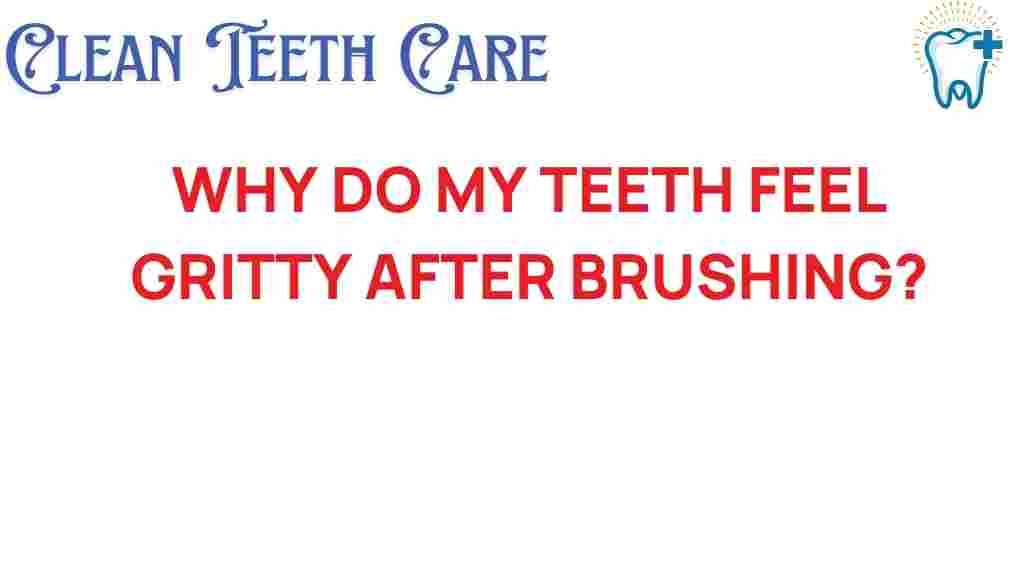Unraveling the Mystery: Why Do My Teeth Feel Gritty After Brushing?
Have you ever finished brushing your teeth only to notice a strange, gritty sensation lingering in your mouth? If the answer is yes, you’re not alone. Many people experience this perplexing feeling post-brushing, leading to questions about their dental hygiene and overall oral care. In this article, we will explore the reasons behind gritty teeth, effective brushing techniques, and tips for maintaining optimal enamel health while addressing any issues with gum sensitivity.
Understanding Gritty Teeth
Gritty teeth can feel uncomfortable and may signal underlying issues with your oral care routine. Understanding the causes can help you take appropriate action. Here are some common reasons why your teeth might feel gritty after brushing:
- Toothpaste Residue: Some toothpaste formulations may leave a gritty residue, especially if not rinsed thoroughly.
- Mineral Deposits: Hard water can leave mineral deposits on your teeth, contributing to that gritty feeling.
- Enamel Erosion: Worn enamel can lead to increased sensitivity and a gritty sensation.
- Food Particles: Incomplete removal of food debris during brushing can also lead to a gritty feeling.
The Importance of Dental Hygiene
Maintaining good dental hygiene is crucial for overall oral health. The feeling of gritty teeth can not only be uncomfortable but may also indicate that your current routine is ineffective. Regularly brushing and flossing, along with routine dental check-ups, are essential components of maintaining your oral health.
Evaluating Your Brushing Technique
Your brushing technique plays a significant role in how clean your teeth feel. Here’s how to improve your brushing routine:
Step-by-Step Brushing Process
- Choose the Right Toothbrush: Opt for a soft-bristled toothbrush to avoid damaging your enamel and gums.
- Apply the Right Amount of Toothpaste: A pea-sized amount of fluoride toothpaste is sufficient for effective cleaning.
- Brush in Circular Motions: Instead of back-and-forth strokes, use gentle circular motions to clean your teeth effectively.
- Don’t Rush: Spend at least two minutes brushing, ensuring you cover all surfaces of your teeth.
- Be Gentle on Your Gums: Avoid aggressive brushing, which can cause gum sensitivity and damage.
Rinsing and Flossing
After brushing, it’s essential to rinse thoroughly to remove any remaining toothpaste residue and food particles. Additionally, flossing daily will help remove debris from between your teeth, reducing that gritty feeling.
Troubleshooting Gritty Teeth
If you consistently experience gritty teeth despite following good dental practices, consider these troubleshooting tips:
- Change Toothpaste: Experiment with different toothpaste brands, especially those specifically designed for sensitive teeth or that claim to reduce residue.
- Check Your Water: If you suspect hard water is an issue, consider using a water filter to reduce mineral deposits.
- Regular Dental Visits: Schedule routine check-ups with your dentist to catch any early signs of enamel erosion or gum disease.
- Stay Hydrated: Drink plenty of water to help wash away lingering debris and maintain saliva production, which is crucial for oral health.
Enhancing Oral Care with Additional Tips
In addition to brushing and flossing, there are several other strategies you can implement to enhance your oral care routine:
- Use Mouthwash: Incorporating an antibacterial mouthwash can help eliminate bacteria and freshen your breath.
- Chew Sugar-Free Gum: Chewing gum can stimulate saliva production, which helps wash away food particles and reduce acidity in the mouth.
- Limit Sugary Foods: Reducing your intake of sugary snacks can help prevent plaque buildup and enamel erosion.
- Stay Informed: Educate yourself about dental health by visiting reliable resources like the American Dental Association.
Understanding Enamel Health
Enamel is the hard, protective outer layer of your teeth, and maintaining its health is crucial for preventing sensitivity and decay. Here’s how you can protect your enamel:
- Use Fluoride: Fluoride helps strengthen enamel and protect against decay. Ensure your toothpaste contains fluoride.
- Avoid Acidic Foods: Limit consumption of acidic foods and drinks, as they can erode enamel over time.
- Consider Dental Sealants: Ask your dentist about sealants, which can provide an additional layer of protection for your teeth.
Dealing with Gum Sensitivity
Gum sensitivity can exacerbate the feeling of gritty teeth. If you notice discomfort, consider the following:
- Gentle Brushing: Switch to a softer toothbrush and adjust your technique to avoid irritating your gums.
- Consult Your Dentist: If sensitivity persists, consult your dentist for personalized recommendations.
- Maintain Gum Health: Regular flossing and rinsing can help keep your gums healthy and reduce sensitivity.
Conclusion
Experiencing gritty teeth after brushing can be concerning, but understanding the underlying causes and addressing them can significantly improve your dental hygiene and overall oral health. By evaluating your brushing technique, ensuring thorough rinsing, and making necessary adjustments to your routine, you can enjoy a cleaner, more comfortable mouth.
Remember to consult your dentist if the gritty feeling persists, as they can provide tailored advice to help you maintain enamel health and reduce gum sensitivity. Implement these dental tips into your routine for optimal results, and say goodbye to gritty teeth for good!
For more information on enhancing your oral care routine, visit our page on dental hygiene tips.
This article is in the category Hygiene and created by CleanTeethCare Team
